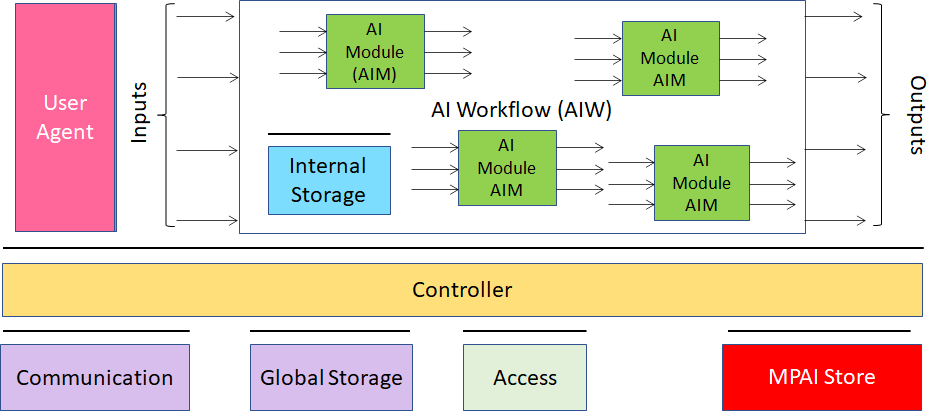Moving Picture, Audio and Data Coding by Artificial Intelligence (MPAI) is an international, unaffiliated , non-profit Standards Developing Organisation with the mission to develop Artificial Intelligence (AI)-based data coding standards, with clear Intellectual Property Rights (IPR) licensing frameworks. Compression and feature-based description are notable examples of coding.
Research has shown that data coding with AI-based technologies is generally more efficient than possible with existing technologies.
MPAI develops its standards using a rigorous process that combines openness to all interested parties at the time the requirements for a new standard are identified and confidentiality at the time the technology used in the standard is integrated.
MPAI application standards are executed in implementations of the MPAI specified AI Frame (AIF) standard (MPAI-AIF), whose Reference Model is depicted in Figure 1. An AIF can execute AI Workflows (AIW), composed of basic processing elements called AI Modules (AIM).
 Figure 1 – The AI Framework (AIF) Reference Model and its Components
Figure 1 – The AI Framework (AIF) Reference Model and its Components
MPAI does not consider its role accomplished with the publication of a Technical Specification. MPAI also delivers Reference Software, a conforming implementation of a Technical Specification whose components are written in a programming language. Some modules (AIM) are available in source code, and some other modules are provided in executable form. MPAI also provides the specification of the procedure, the tools and the data – Conformance Testing – to test the conformance of an implementation to a standard.
MPAI makes a further step. MPAI provides the specification of the procedure, the tools and the characteristics of the data – Performance Assessment – to assess the degree of Reliability, Robustness, Fairness and Replicability of an implementation, collectively called Performance.
The ecosystem created by MPAI standards includes the following: MPAI issuing standards, implementers developing implementations and end users using implementations. However, there are 3 serious questions whose answer determines the viability of the ecosystem.
- Who verifies the security of an implementation?
- Who tests the conformance of an implementation?
- Who assesses the performance of an implementations?
MPAI has selected the approach, depicted in Figure 2, to:
- Establish the MPAI Store, an MPAI-controlled not-for-profit entity in charge of answering the first two questions, and
- Appoint Performance Assessors in charge of answering the third question.
 Figure 2 – The entities operating in the MPAI Ecosystem and their interactions
Figure 2 – The entities operating in the MPAI Ecosystem and their interactions
The MPAI Store offers secure access to implementations executing AIWs composed of AIMs in AIF implementations that:
- Are proprietary – Level 1.
- Conform to MPAI application standards (e.g., MPAI-CUI and MPAI-MMC) – Level 2.
- Whose Performance has been assessed by a Performance Assessor – Level 3.
The MPAI Store always informs end users of the level of guarantee offered by an implementation.
AI can offer great new benefits to humankind. MPAI standards offer the way to practically promote and disseminate use of AI. The Governance of the MPAI Ecosystem assures implementers that the Store holds interoperable implementations and end users that the implementations they enjoy have undergone different levels of scrutiny.

